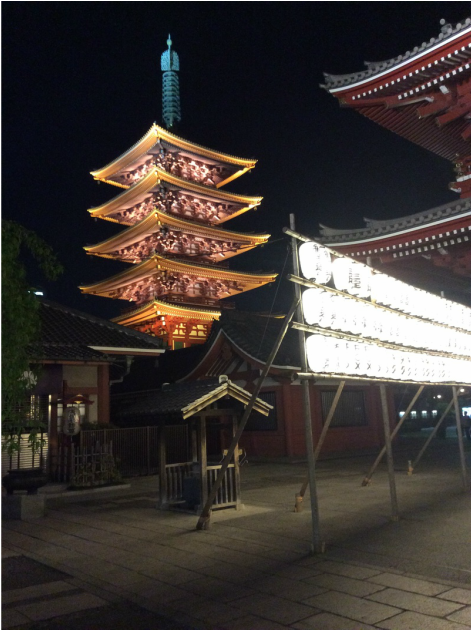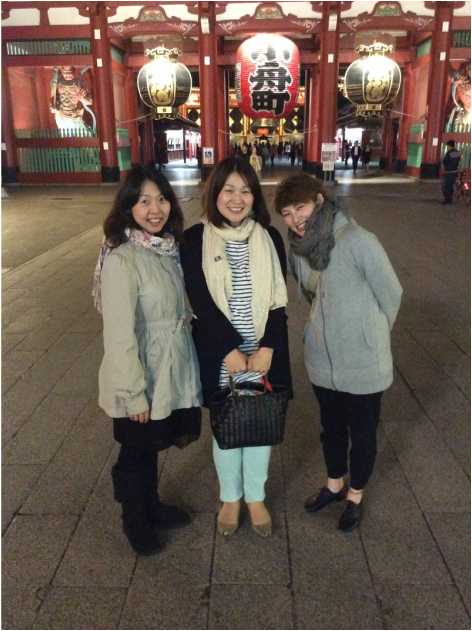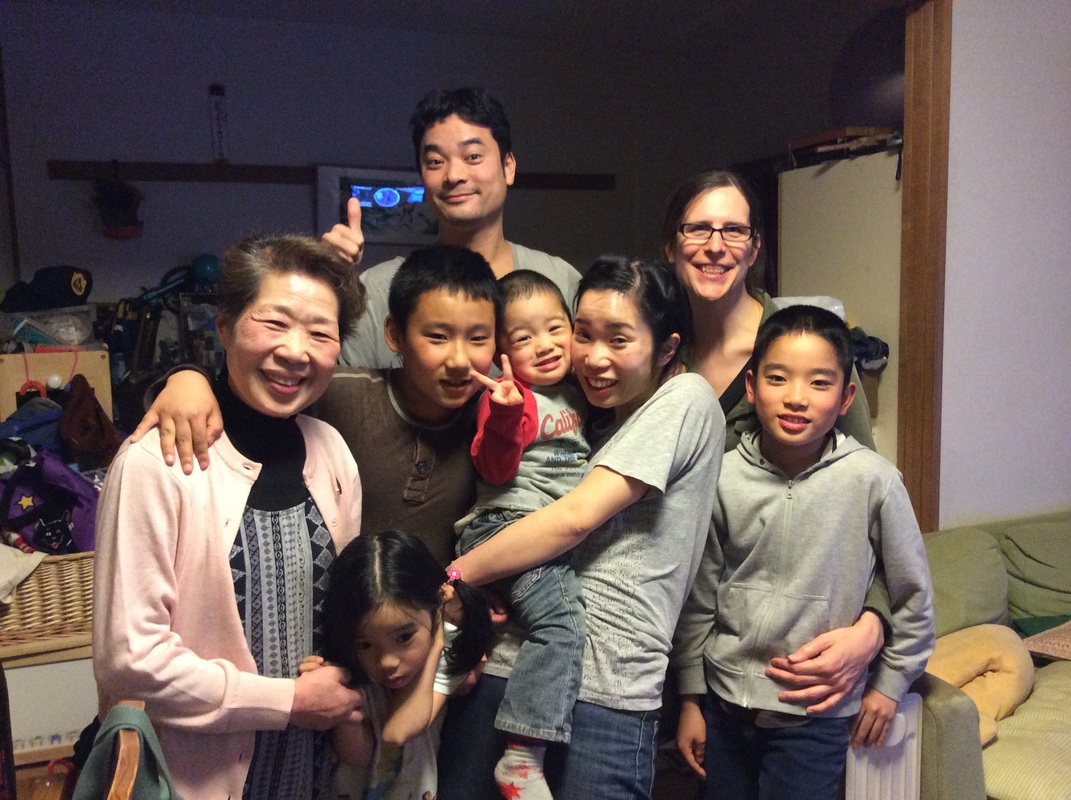The most difficult part of this trip actually had nothing to do with the airplanes or airports... the hardest part was figuring out how to find my hostel. Hurdle number one was figuring out the metro and train system to get to the general vicinity. I did pretty well with that. Wandering around Tokyo with my way-too-heavy luggage for an hour on zero sleep almost had me in tears, though, especially the moment I realized I had been walking in the complete wrong direction.
That night, I met up with three Japanese friends who I hadn’t seen in fifteen years... they were formerly exchange students at my university, and we lived in the same dorm together those many moons ago. Two had forgotten almost all of their English, whereas one was still able to speak quite well, so our conversations were about 90% Japanese with an English word thrown in every few sentences by either my friend or myself. It was a wonderful night; they took me out for tempura and then sightseeing around the old town (Asakusa) with its temples, lanterns and a few straggling cherry blossoms.
My favorite quote from the above conversation:
“France is the greatest place in the world: we have no money and no power, but it’s okay... We’re French!”
The following day, I wandered Tokyo by myself. I asked the lovely Japanese woman who was cleaning the hostel’s kitchen where to find the sakura (cherry blossoms), and she mentioned Ueno park, so I headed off in that direction.
I was hungry, and thirsty, but almost nothing was open yet since it was only 7am. I noticed that Starbucks was open, though... Yep, I became one of “those” Americans. At “Staa-bakkusu” I had a Maccha green tea and a “chokoletto chahnku kuukkee” (“chocolate chunk cookie”). I enjoyed them while I watched the world go by and studied Kanji.
After wandering around the zoo and the “hanabi” (cherry blossom flower viewing) trail in the park for a couple hours, I found a spot to sit down and study some more. I was feeling meditative that morning, and a tad overwhelmed, so I wasn’t approaching many people to talk to. Also, I was working on sensory mindfulness, since I now have more time to do so; I was paying attention to the sounds, sights, smells and feelings of what was going on around me. Keying in to your senses is a great way to stay “in the moment.” Well, for as long as you can manage it, anyway. :)
However, my solitude was not meant to last, as the spot I was sitting on turned out to be prime play space for families to bring their kids to the park. Several of the kids pestered me into playing with them, which wasn’t hard, since I love playing with kids anyway. Thusly, I learned the word for “you’re it” in Japanese (“oni”) so that I could play “tag” with them, among other games.
A while later, their parents wandered over and struck up a conversation to make sure I was kosher. They were my age, and we had quite a bit in common. Neither of them spoke any English, nor did the kids, but as it turns out, you can fake your way through many conversations even if you only understand 15% of what is being said. I am now the princess of the Japanese version of “mm hmm...” and “oh really?”
They invited me over for dinner, where they made gyoza, and introduced me to the rest of the extended family. I had several great conversations with the grandmother, who says she also loves to communicate with people, and that she and I “share one heart.” What a beautiful turn of phrase, and what a beautiful feeling it evoked in me.
Tokyo to Naha, Okinawa
The metro/airport/airplane/airport transition was again smooth, which I was thankful for. A representative of my school picked me up at the airport, and thus began my two-day whirlwind tour of “what you have to do to be legally present in Japan for six months.”
He took me to my dorm, the school, city hall, the bank, and several other places I didn’t understand. I signed more forms than I can shake a stick at, almost none of which had any English on them whatsoever. I just printed, signed and dated wherever they told me to, let them fingerprint me, showed them my passport, visa and resident card whenever they asked, and said “mm hmm” and “oh, really?” many many times.
Thank God I am here with a reputable school, and get trustworthy chaperoned help for all the above. Even so, it is kind of scary signing dozens of forms that I truly understand absolutely nothing about. I feel great empathy for people in similar situations due. This is a humbling experience.
I now partake in the Japanese National Health system, am a registered student (Japanese language), am a legal resident, have a bank account, and have ordered my iPhone 5s.
I have also been officially poked and prodded by my school. After several hours, various conversations and a ten-page test, my spoken Japanese has been pronounced “amazing,” my writing “passable,” my reading “lamentable,” and my grammar “atrocious.” The instructor is quite confused as to where to put me, since most students come in with significantly better writing/reading than speaking, and I’m the opposite.
Meanwhile, outside of school, I have gone out to eat and had great conversations with owners, servers and patrons of several small family-owned restaurants. Again, I’m only catching about 15% of what is being said, but I am thoroughly enjoying myself. I really want to learn about Okinawan history, as Okinawans tend to consider themselves Okinawan first, Japanese a distant second.
My dorm/apartment is a fascinating mix of traditional and modern. From the entryway to the room doors is all modern, with kitchen appliances, bathroom and table and chairs. The bedrooms, however, are completely traditional. My room is a six-tatami-mat room (about 3 x 4 meters, or 9 x 12 feet), with traditional Japanese futon (floor) sleeping arrangements. We have the rice paper sliding doors, and heavier sliding doors on the closet space. There is an air conditioner, but the remote is in Kanji, so I have no idea how to use it.
I am struggling to describe what it’s like to live in Japanese culture. Instead of trying to explain it in words, I am going to share a story that my new Tokyo family told me:
An American businessman was staying with a host family while on business in Japan. He was driving at 3am in the morning when his car broke down. His Japanese wasn’t very good, so he made a panicked phone call to his host family to come pick him up, planning to figure out how to deal with the car in the morning. A little while later, a car pulled up and stopped behind him. He gratefully ran over to jump in the car but was stunned when he didn’t recognize the man or the car.
The driver calmly explained to the businessman that he had called the wrong number, but that because he needed help, the Japanese man had come to pick him up, and that he would be happy to take him to his host family’s house.
The idea that you could call a stranger at 3am and that they would come pick you up is NOT strange in Japan. It is completely normal, and generally completely safe for both parties involved.
Bye for now,
Sam



 RSS Feed
RSS Feed